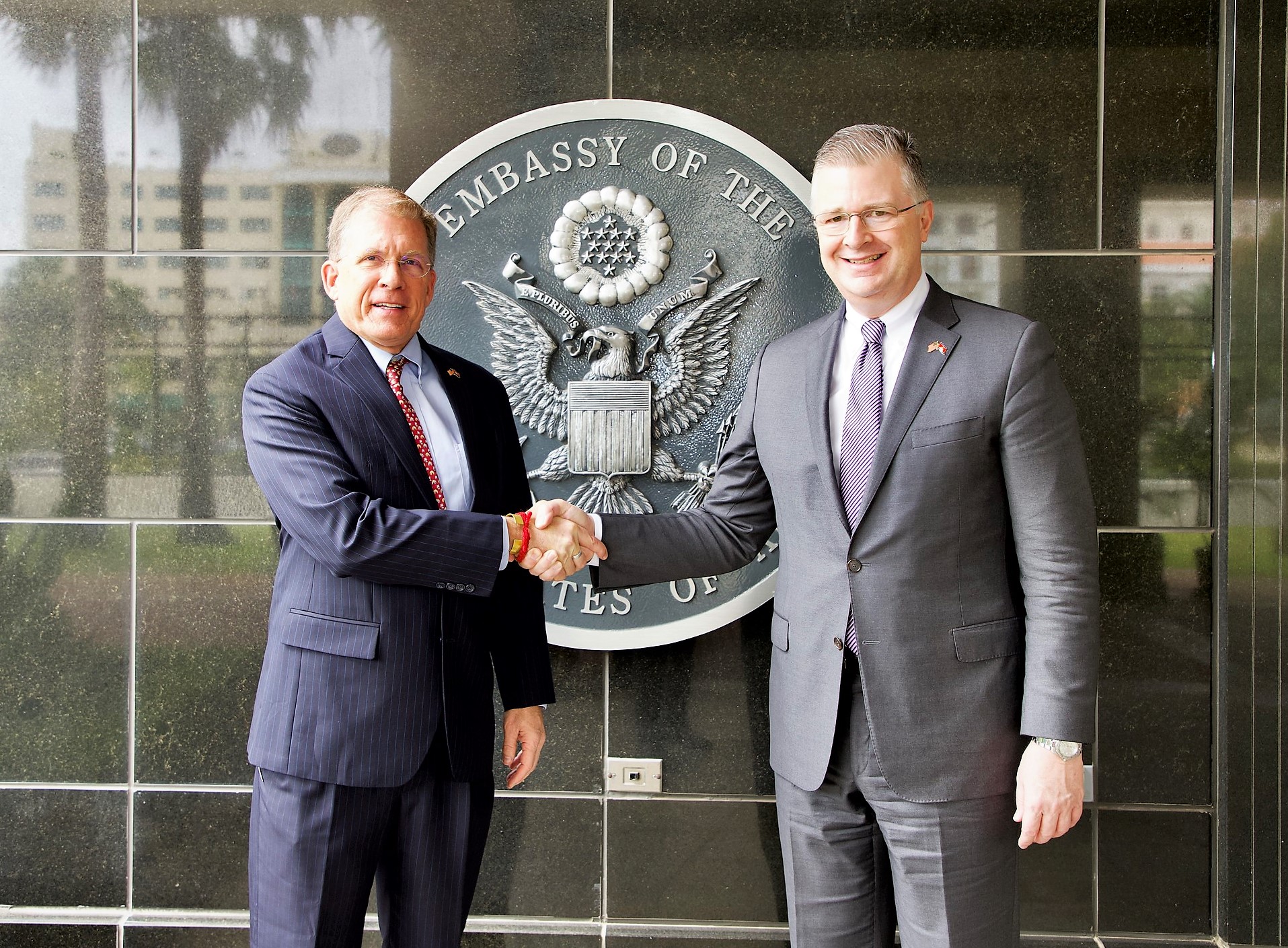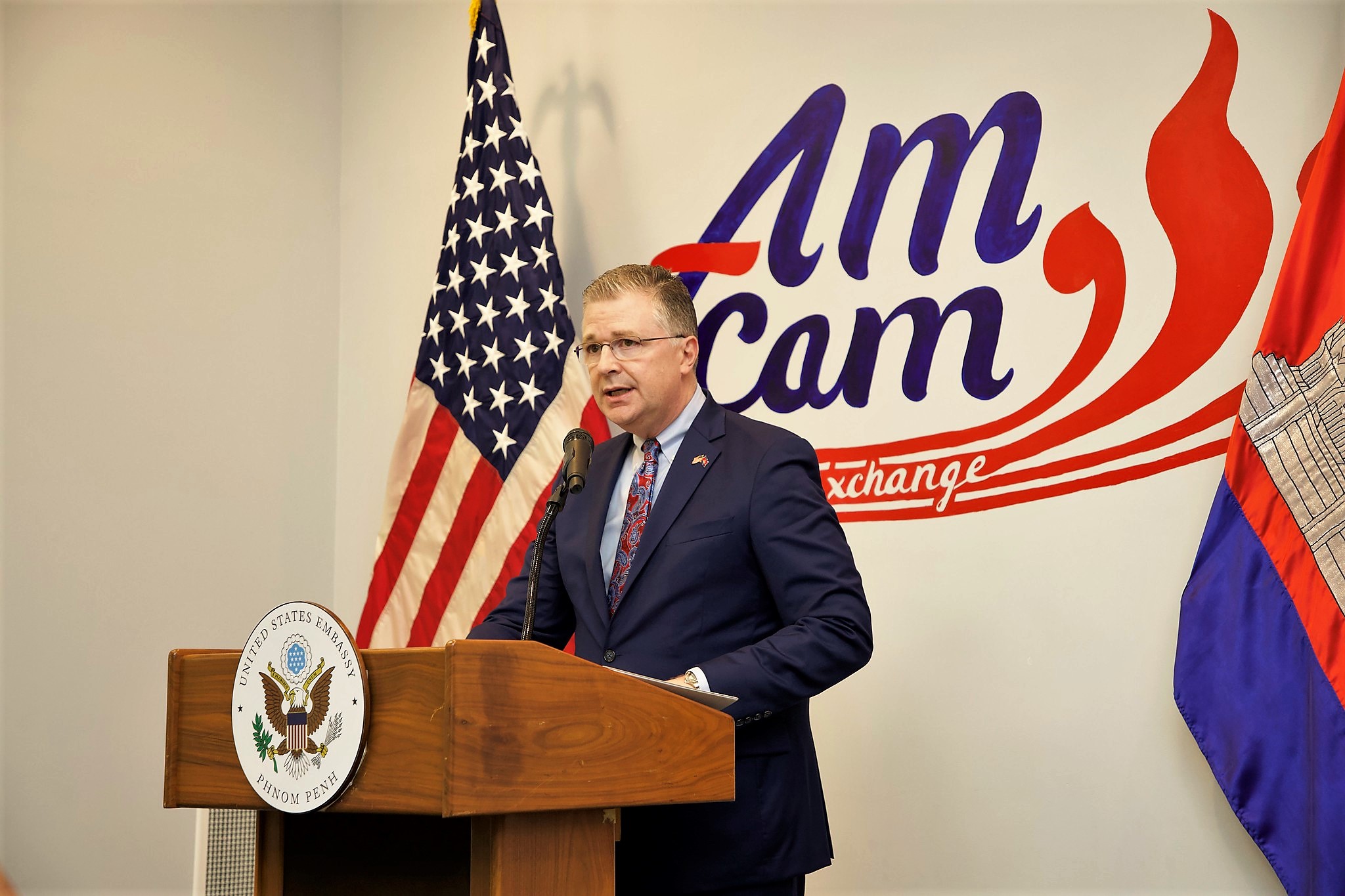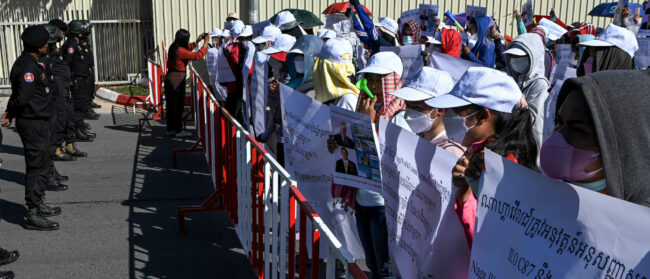Cambodia has drawn an expanded international role since assuming the rotating ASEAN chairmanship for 2022, which so far has included joint hosting duties at a May conference of the 10-nation bloc and the United States in Washington, D.C.
The most recent event highlighting the Kingdom’s heightened diplomatic position was the arrival in Phnom Penh of Daniel Kritenbrink, U.S. assistant secretary of state for East Asian and Pacific Affairs, who met with members of Prime Minister Hun Sen’s government on 12 and 13 July.
“My visit is one of many planned by senior U.S. officials this year as we work with Cambodia again in its role as ASEAN chair,” Kritenbrink said during a 13 July press conference. “I’m happy to declare that Cambodia’s success as ASEAN chair is our success and it is in all our interests that Cambodia succeeds.”
Kritenbrink said he intends to return in August for the 55th annual ASEAN Foreign Ministers’ Meeting and Related Meetings. Some Southeast Asia commentators have called on President Joe Biden to follow up the Washington meeting by attending the Cambodia event to display U.S. commitment to the region, but Kritenbrink would not reveal whether he would be joined by any other high-ranking American officials.
Kritenbrink said he met with senior Cambodian officials on 12 July including Deputy Prime Minister and Foreign Minister Prak Sokhonn and Deputy Prime Minister and Interior Minister Sar Kheng. The diplomat repeatedly stressed continued American support for Cambodia.
The U.S. donated 3 million Covid-19 vaccination doses bilaterally and through the international COVAX initiative and provided more than $16 million in supplemental pandemic assistance to the Kingdom, Kritenbrink said, promising more U.S. vaccine deliveries this year. He noted there has been more than $3 billion in overall assistance for Cambodia’s public health, education, agriculture, food security and the environment.
Despite the expressions of solidarity, Kritenbrink said he also broached fundamental disagreements over the Cambodian government’s human and political rights record.
“We remain troubled by continued restrictions on civic space and fundamental freedoms, as well as the targeting of political opposition leaders and other civil society and human rights advocates,” he said, noting the tactics undermine “multiparty democracy and the rule of law.”
Opening the floor to reporters, Kritenbrink responded to questions on various topics including Asian-Pacific economics, ASEAN’s inability to curb the ongoing conflict and civilian abuses in Myanmar and an upgrade to Cambodia’s Ream Naval Base with the reported assistance of China’s military, which he said constitutes “possible threats” to Cambodian autonomy. A partial transcript follows.

Cambodia and ASEAN
If you look at the joint vision statement [from the U.S.-ASEAN special summit in May], of which we’re very proud, you can see it reflects the breadth and depth of the many areas on which the United States and the countries of ASEAN are engaged. And that’s everything from economic development to security to growing people-to-people ties and to advancing our operation on health, climate and many other areas. So what we’d like to see is a continuation of that kind of engagement.
I want to reiterate the United States of America is absolutely committed to ASEAN centrality and to the ASEAN outlook on the Indo-Pacific. I think we share in the vision of what kind of a region we want to live in. A region that is free and open, where all countries large and small play by the rules and countries are able to make their own sovereign decisions free of coercion.
In my meetings, again, with Cambodian officials, I reiterated we are committed to Cambodia’s success as chair. We are committed to the success of ASEAN. But we absolutely cannot allow the summit to be conducted in a manner that signals business as usual, particularly regarding the participation of Russia, given Russia’s unprovoked and illegal war of aggression against Ukraine.
Ream Naval Base
I had the opportunity to convey the concern of the United States regarding an exclusive PRC [People’s Republic of China] military presence at Ream, which we believe would undermine regional security. We encourage the government of Cambodia to be fully transparent about the intent, nature and scope of the project at Ream. And we think that transparency would benefit the Cambodian people, neighbouring countries and ASEAN more broadly and the entire region.
Indo-Pacific Economic Framework (IPEF)
If you take in the aggregate of the 10 countries of ASEAN, we’re talking about the world’s fourth or fifth largest economy depending on how you count it, and some 600 million citizens. So this is a vitally important region of the world to us.
Specifically on IPEF, we were really delighted in the context of President Biden’s recent trip to Seoul and Tokyo. We were able to, again, further demonstrate the commitment to other allies and partners in the region, namely in Northeast Asia, and while in Tokyo we formally launched IPEF. We now have 14 countries in total that have signed on. This is designed to be a new type of 21st-century agreement in which we are going to focus on the most important sectors in the 21st-century economy and to make sure that we set the standards and the rules and the norms that will allow all of us to prosper on issues ranging from technology to supply chains to energy, particularly green energy.
Cambodian 2023 national elections
Issues related to democracy, human rights and, we believe, universal values are central to American foreign policy worldwide. And therefore they’re also an important component of our engagement in Asia, in Southeast Asia and specifically here in Cambodia. So I had an opportunity, both in discussions with the various Cambodian senior officials that I met and also with other members of Cambodian civil society, was able to make clear America’s commitment to those values.
We believe that all peoples, including here in Cambodia, ought to be able to exercise their rights and freedoms
Daniel Kritenbrink, U.S. assistant secretary of state for East Asian and Pacific Affairs
We believe that all peoples, including here in Cambodia, ought to be able to exercise their rights and freedoms, including those rights enshrined in the Cambodian constitution and as outlined in various international documents including the UN Declaration of Human Rights. So our hope and our expectation would be that elections, whether in 2023 or beyond, would be conducted in a fair and open and transparent manner.
Myanmar and ASEAN
I had a very productive and constructive exchange with Deputy Prime Minister and Foreign Minister Prak Sokhonn on the issues of Myanmar. I expressed to the deputy prime minister our gratitude for his role as the ASEAN special envoy. I reiterated the points that Secretary Blinken had made in Bangkok when he was asked a similar question about how the international community and our friends in ASEAN are doing on this issue. And I think the secretary was very candid that, unfortunately, we’ve seen very little progress inside Myanmar. In fact, I think I would argue that by virtually all assessments, the situation continues to worsen. And as we’ve seen, the tragic killing of now more than 2,000 individuals in Myanmar.
Therefore, as the secretary outlined, it’s incumbent upon all of us in the international community, including our friends in ASEAN in the lead, to ensure that we adhere to the ASEAN Five-Point Consensus and that we continue to act to increase pressure on the junta in Myanmar to cut off their sources of funding and to increase pressure on them to compel them to cease violence, to release all of those unjustly detained and to work to return Myanmar to a path of democracy.
Unfortunately, Myanmar has chosen not to adhere to the Five-Point Consensus at all. Therefore, again, it’s incumbent on all of us, especially in ASEAN, given your leading role, but the United States and the rest of the international community as well, to continue to increase the pressure on the regime in Myanmar.
Myanmar’s National Unity Government
I did have an opportunity to express the view of the United States of America that it is important and appropriate to engage various officials in the National Unity Government and to engage all of those in Myanmar who are working for a better future. And as is outlined in the Five-Point Consensus on Myanmar, the ASEAN Five-Point Consensus, that is something that the region should allow, but to date has not.
This transcript was condensed for brevity.


